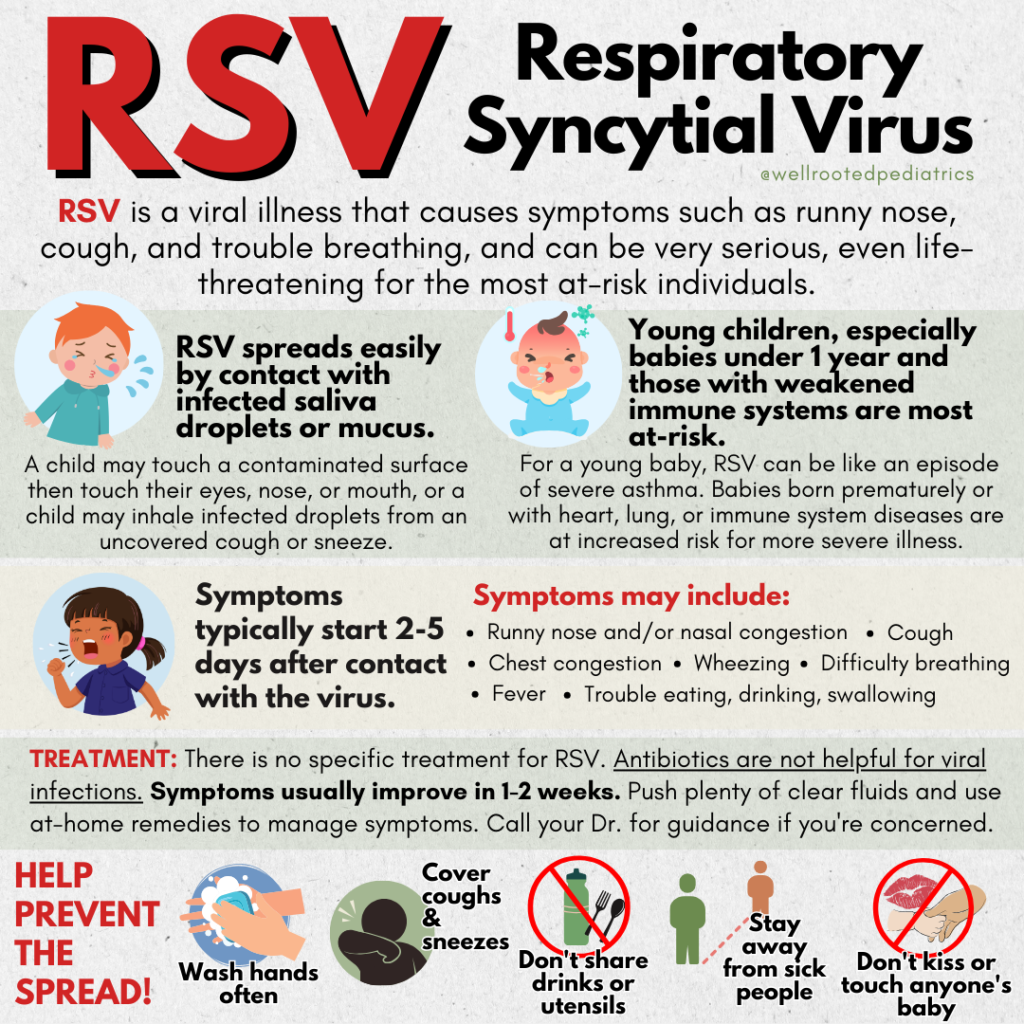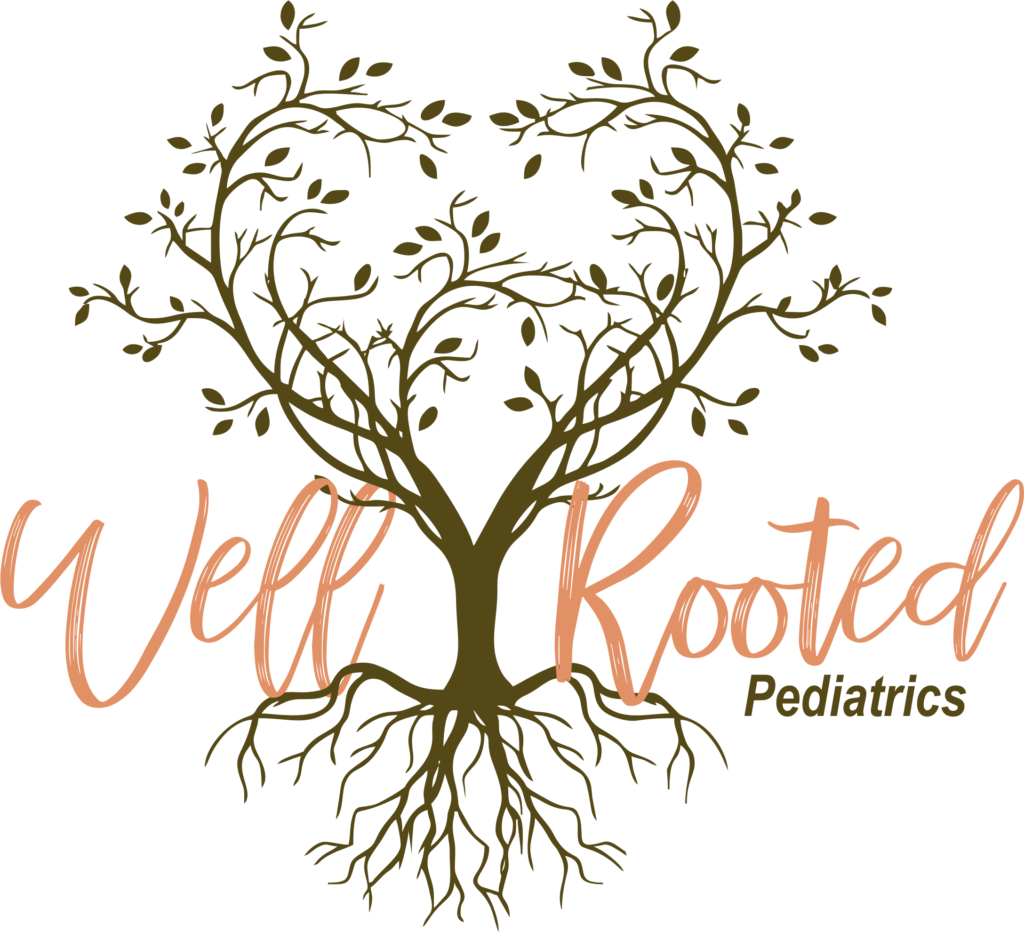RSV – Be Informed! Help Prevent The Spread
Understanding Respiratory Syncytial Virus (RSV) in Infants and Children 🤧
Here at Well-Rooted, we hear from a lot of concerned parents when it comes to respiratory illnesses in their little ones. One such illness that frequently crops up, especially in the colder months, is Respiratory Syncytial Virus, commonly known as RSV. Let’s take a look at what is RSV is, how does it spread, its symptoms, and what you can do to treat and prevent it.
What is RSV?
RSV is a common respiratory virus that usually causes mild, cold-like symptoms. Most children will have been infected with the virus at least once by the time they’re two years old. While it can infect individuals of any age, RSV can be particularly severe in infants and young children.
How Does RSV Spread?
RSV is highly contagious and can be spread through:
😘 Direct contact: Such as kissing the face of a child with RSV.
💦 Airborne droplets: When an infected person coughs or sneezes.
🖐️ Contaminated surfaces: Touching a surface or object that has the virus on it, like doorknobs or toys, and then touching the face.
Symptoms of RSV
Symptoms typically appear within 2 to 6 days after getting infected and can include:
🤧 Coughing or wheezing that doesn’t stop
😮💨 Fast or troubled breathing
👃 Spread-out nostrils or a caved-in chest when trying to breathe
😨 Bluish color around the lips, mouth, or fingernails
🤒 Fever
😪 Runny nose
😞 Decreased activity and appetite
🚩 Red Flags to Watch For 🚩
While most cases of RSV are mild, there are certain red flags that require immediate medical attention:
🚩 Difficulty breathing: If your child is struggling to breathe or is breathing very rapidly, it’s a sign to seek help.
🚩 Poor feeding: Infants who are unable to feed well or are showing signs of dehydration (fewer wet diapers, for example) need to be evaluated.
🚩 Lethargy: Excessive sleepiness or unresponsiveness is a serious warning sign.
🚩 Cyanosis: A bluish tint to the skin, especially around the lips and fingernails, indicates a lack of oxygen.
Treatment Options
There is no specific treatment for RSV. Management involves:
😌 Supportive care: Ensuring the child is well-hydrated and comfortable.
💊 Medication: Fever reducers and pain relievers like dye-free ibuprofen can be used as directed for fever and discomfort when necessary. For low fevers, and if the child is otherwise comfortable, we recommend allowing the fever to run its course and do its job to defend the immune system!
💧 Humidified air: A cool-mist vaporizer can help ease breathing difficulties.
👃 Saline nasal drops: These can help clear a stuffy nose for better feeding and sleeping.
In severe cases, hospitalization may be required to provide oxygen therapy, IV fluids, and more intensive supportive care.
Prevention is Key
Preventing the spread of RSV is crucial, especially since infants and young children are at risk of severe illness:
🧼 Handwashing: Regular and thorough handwashing can prevent the spread of RSV.
❌ Avoid exposure: Keep infants, especially premature ones, away from people with colds or crowds during RSV season.
🫧 Clean and disinfect surfaces: Regularly clean surfaces that are frequently touched.
👩🍼 Breastfeeding: If possible, breastfeed your baby. Breast milk contains antibodies and other important immune boosters.
When to See a Doctor 🩺
If your child is showing signs of RSV, especially if they’re under six months old or have other health conditions, it’s important to see a healthcare provider. Early intervention can prevent more severe illness.
🌿 The Functional Medicine Approach
In functional medicine, we look at the body as an interconnected system. Supporting the immune system through proper nutrition, adequate sleep, stress management, and supplementation where necessary can help in both the prevention and recovery from illnesses like RSV.
While RSV can be worrying, most children recover with no lasting effects. However, being informed, vigilant, and proactive in seeking care can ensure your child gets through an RSV infection with as little discomfort as possible.
Stay healthy and remember, we are here to support your family’s journey to wellness! If you have concerns or questions about RSV or any other health matters, don’t hesitate to reach out.

OUR LOCATIONS
Crystal Lake, IL
390 Congress Parkway Suite J, Crystal Lake, IL
Oak Brook, IL
814 Commerce Drive Ste 150 Oak Brook, IL 60523
HOURS OF OPERATION
Crystal Lake, IL
| Monday | 9am to 5pm |
| Tuesday | 9am to 5pm |
| Wednesday | 9am to 5pm |
| Thursday | 9am to 5pm |
| Friday | 9am to 5pm |
| Saturday | 1st, 2nd & 3rd Saturday Of The Month |
Oak Brook, IL
| Monday | 9am to 5pm |
| Tuesday | 9am to 5pm |
| Wednesday | 9am to 5pm |
| Thursday | 9am to 5pm |
| Friday | 9am to 5pm |
| Saturday | Closed |
Crystal Lake Office
390 Congress Parkway Suite J
Crystal Lake, IL
Phone 815-322-9300
Fax 815-322-9315
Email [email protected]
Oak Brook Office
814 Commerce Drive Ste 150
Oak Brook, IL 60523
Phone 815-322-9300
Fax 815-322-9315
Email [email protected]
Office Hours
Monday: 9am to 5pm
Tuesday: 9am to 5pm
Wednesday: 9am to 5pm
Thursday: 9am to 5pm
Friday: 9am to 5pm
Saturday: Varies By Location

